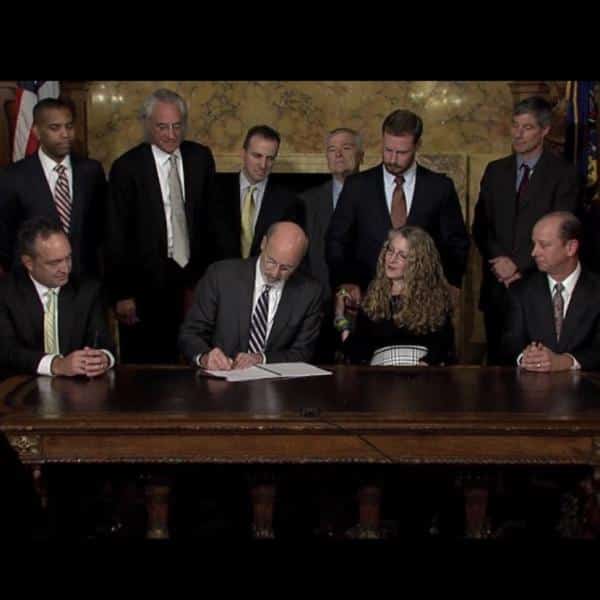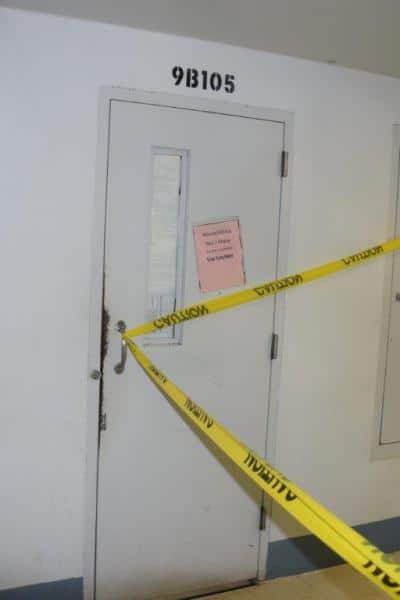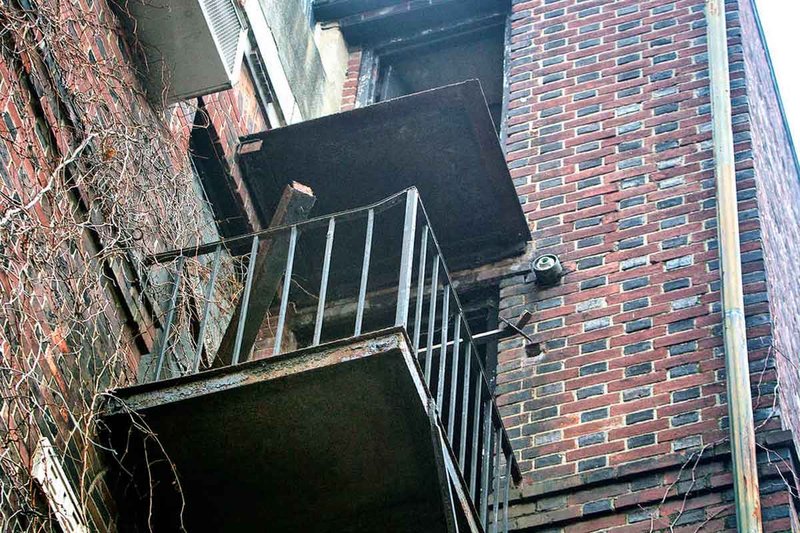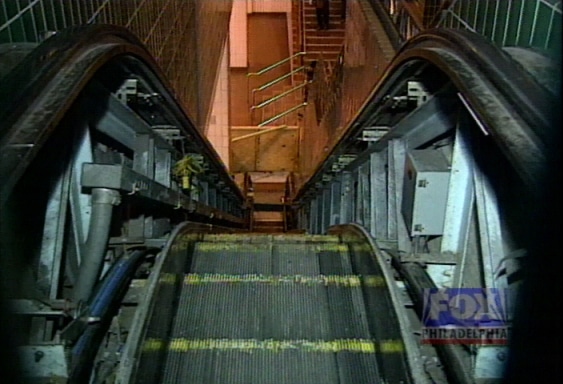Kline & Specter cases have produced safety changes to benefit the community as well as financial compensation to the client
- A case in which the firm obtained a substantial settlement for the family of a Northampton County man electrocuted because of a fallen power line also resulted in a $1 million fine against the power company and its promise to make $16 million in improvements. The Pennsylvania Public Utility Commission approved the settlement in 2021 with Metropolitan Edison Co. in the case involving the death of high school teacher Thomas Poynton Jr., 31, who was killed as he stepped onto his backyard lawn, where a high-voltage power line had come down.
- Kline & Specter attorneys were instrumental in the authoring and passage of the Timothy J. Piazza Anti-Hazing Act signed into law on Oct. 19, 2018. Named for the Penn State pledge who died in 2017 in a night of alcohol poisoning from hazing, the new law was hailed as the most comprehensive anti-hazing measure in the nation. The law creates a new felony offense of aggravated hazing and allows confiscation of property, such as a fraternity house. The law, designed as a deterrent, provides safe harbor immunity for those who call for help or render assistance in a hazing incident.

- In addition to the new anti-hazing law, a previous settlement obtained by Tom Kline with the national Beta Theta Pi fraternity over Timothy Piazza's death brought about a comprehensive 17-point reform package intended to help prevent similar tragedies in the future. The reforms include mandates that frat houses be substance-free, more visits by staff, mandatory faculty advisors, encouragement for live-in advisors, better reporting of violations, installation of security cameras, a discipline structure for violations and required risk management education. (Read the complete list)
- A 2017 case led not only to a $7 million settlement but also important policy changes at a Delaware County prison following the suicide of a mentally ill inmate who was kept in solitary confinement for 52 straight days at the prison. The private, for-profit company that runs the George W. Hill Correctional Facility agreed to require that if a mentally ill inmate must be placed in solitary for security reasons, the inmate must be evaluated by a psychologist within 24 hours. Also such confinements must now be approved by the warden.
- An agreement in a 2017 medical malpractice case resulted in a substantial monetary settlement and changes in hospital protocol and training that could help many patients in the future. The case involved the death of a woman due to a blockage that developed in the tubing of an anesthesia machine during a tracheostomy. Under the settlement obtained by Shanin Specter, Amy Guth and Gary Zakeosian, an anesthesiologist who is one of the firm’s five doctor/lawyers, the hospital will now require improvements in pre-operative anesthesia equipment checks as well as in procedures during operations.

- Tom Kline got the City of Philadelphia and the police department to agree to new training protocols for plainclothes officers in a settlement that followed the shooting of a take-out food deliveryman who they mistook as a criminal suspect. Among the changes: updated rules governing plainclothes officer attire, proper placement and display of patrol badges, and permitted and prohibited activities and interactions with the public, including how and when to identify themselves as police officers. The settlement also included a $4.4 million payment for the victim, Philippe Holland, who survived but suffers permanent seizures and other injuries.
- A three-pronged effort by Kline & Specter attorneys helped prompt Philadelphia to require inspections of all fire escapes. Passage of the measure in June 2016 followed a tragedy in which a young man was killed and two other people were injured when a fourth-floor fire escape landing collapsed in Center City. The firm filed suit on behalf of two of the victims, including Albert Suh, who was killed. Shanin Specter followed with news media appearances calling for mandated inspections while Dominic Guerrini testified before a City Council committee on the need for inspections. The result was an ordinance that all city fire escapes be inspected by July 1, 2017 by an independent structural engineer and then be re-inspected at least every five years thereafter. The lawsuits resulted in confidential settlements.

- In an earlier case, Specter convinced the Enforcement Bureau of the Pennsylvania Public Utility Commission to require West Penn Power Co. to inspect its power lines, including the use of modern infra-red technology, and repair or replace any potentially dangerous lines or connections. The utility also agreed to retrain all its linemen on proper installation. The agreement came after a $109 million Pittsburgh jury verdict – and a subsequent $105 million settlement – in the case of a woman killed on her own property by a fallen power line. Specter proved in the nearly four-week trial that the line failed because it had not been properly cleaned with a wire brush before installation. The line came down on 39-year-old Carrie Goretzka on a clear and sunny June day. The same line had fallen and damaged the Goretzkas’ property five years earlier.


- The Southeastern Pennsylvania Transportation Authority approved a $30 million program to revamp its entire escalator system after Tom Kline won a $51 million verdict in the case of a little boy whose foot was torn off in a subway station escalator. Following the highly publicized Hall v. SEPTA case, the transit authority stepped up its inspections and preventive maintenance and brought in an outside firm to inspect all of its 38 escalators, with at least 10 later replaced and others modernized with safety features. SEPTA, which was fined after the jury verdict by the judge for concealing documents, also revamped its legal department with new staff and pledged to create an improved system to track and investigate accidents as well as to enhance its handling of legal claims.

- Similarly, Kline’s lawsuit in the death of a 12-year-old boy who was struck when he poked his head out of a SEPTA train helped to impel an investigation of security and replacement of train car locks systemwide. The boy had made his way into a motorman’s car with an open window by evidently picking the lock on its door. Kline inspected the locks himself and noted to the news media how he was able to open one using only his finger. SEPTA replaced all of the locks.
- The City of Philadelphia agreed to pay $1.125 to the estates of a man and his infant son who were killed when they were run down on a city sidewalk by a speeding police car that went out of control. But importantly, Specter, after a lengthy discussion with then Police Commissioner John Timoney – and his discovery that in the previous five years police vehicles were involved in more than 3,800 crashes – got the department to agree to a series of reforms designed the reduce the number of fatal accidents in the future. Among the new policies was a requirement that officers log 60 hours behind the wheel with a veteran before driving alone and a new rule that squad cars responding to emergencies must stop (rather than slow) at red lights and stop signs.

- Specter wasn’t satisfied after he won a substantial settlement for a Bucks County teenager shot and badly injured by a defective Daisy BB gun. He went before the U.S. Consumer Product Safety Commission in an appeal for removal of 7.4 million of the “toys” from store shelves and general circulation. The CPSC called for a recall and its commissioner, Ann Brown, made a national appeal to get the defective high-powered air rifles out of the hands and houses of children. Specter’s client, Tucker Mahoney, died several years after suffering a severe brain injury as a result of being shot with one of the guns.

- A local Hospital paid a confidential financial settlement but also agreed to hold grand rounds to educate staff on the importance of reviewing files and informing patients of the nature of their illnesses. Lawrence Strange was a patient at the hospital when staff failed to inform him about a nodule found on his lung because various doctors wrongly thought one another had told the patient. Nineteen months later, Strange was diagnosed with advanced lung cancer and he died six weeks later. The hospital held a formal lecture in May 2013 with some 40 doctors in attendance in honor of Strange and stressed the importance of various hospital protocols, including proper communication among doctors and staff, documentation and follow-up of test results. The case was litigated by Tom Kline, Regan Safier and Geary Yeisley.
- A worldwide safety improvement came about as a result of what Specter once termed “the worst day of my life.” It happened on a trip to Africa by Specter and his wife, Tracey, with several friends. During a drive over a mountain pass, one of three sport utility vehicles in their convoy went off the road and down a steep embankment, rolling over several times. The wife of a dear Specter friend was ejected and crushed by the vehicle. Specter rode down the Atlas Mountains in the back of a pickup truck with his friend and the woman’s body. Upon returning to Philadelphia, Specter sued the automaker for not equipping all of its vehicles with rear passenger seat belts, including those SUVs shipped to Africa to be assembled from kits. Monetary terms of the eventual settlement (and the automaker’s name) were confidential, but included an agreement that the company would never again sell a vehicle of any kind—kit or otherwise—without belts for all the seats.
- In the middle of trial, Specter settled a case involving a student at the University of Pittsburgh who sustained severe brain damage. Erica Lynne Pratt was in math class when she suffered cardiac arrest. Campus police were summoned, but instead of administering aid, the first officer on the scene decided to wait and also prevented two fellow students trained in CPR from trying to resuscitate the 19-year-old student. Her injury left her unable to walk and with difficulty speaking. In addition to a substantial financial settlement, Specter obtained an agreement from the university to improve emergency medical response. It pledged to hire a qualified medical director and begin quarterly refresher courses for campus police on CPR and the use of automatic external defibrillators along with twice yearly testing of their skills. (News coverage)
- In addition to a major monetary settlement, Specter won important reforms at Graduate Hospital in Philadelphia in a case involving the death of a baby following a cervical cone biopsy performed on his mother during pregnancy. The procedure was performed despite the risk of necessitating an emergency delivery that the hospital was not equipped to handle since it lacked an obstetrics department, adequate fetal monitoring devices and a neonatal unit. The baby, Brandon Molloy, suffered brain damage due to asphyxia and died seven months later. Under the legal settlement, Graduate Hospital agreed to halt procedures on pregnant women.
- In a settlement of a case, Tom Kline forced an unlicensed psychotherapist who had sexual contact with a teenage patient to agree to never practice psychotherapy or any other form of counseling ever again in the United States. Andrew J. Smith, who had practiced under the supervision of three psychologists, tearfully read a public statement that he was ashamed of his actions, which also included taking nude photographs of his young client. He also noted in his statement that Pennsylvania law allowed him to practice without a license and he urged the state legislature to adopt stricter regulations of therapists and tighter accountability. A financial settlement of as much as $3.8 million was also reached in the case.

- In a defamation case, Specter, with Kline, represented noted Philadelphia criminal defense attorney Richard Sprague in a suit filed against radio personality Howard Eskin. Eskin alleged that Sprague attempted to interfere with the case and might have paid off a witness to change his testimony in a prosecution of 76ers star Allan Iverson. None of the accusations was true. All charges against Iverson were eventually dropped in the case. The civil suit was settled with Eskin making a public apology and being suspended from the radio show for 30 days. His employer, Infinity Broadcasting, also agreed to pay "substantial" compensation to Sprague. (News coverage)
- A week after Michael Trunk and Kristen Sipala won a $7.8 million jury verdict in April 2014 for the family of a jockey killed at Parx Casino & Racetrack, the company banned non-equine animals from the premises. Mario Calderon, 55, was thrown from a horse he was exercising when it was spooked by one of the chickens allowed to roam free at the track. Calderon’s foot caught in a stirrup and he was left to dangle upside-down on the side of the thoroughbred, which kicked him repeatedly in the chest and head. Neither the jockey’s death in May 2010 nor the filing of a lawsuit convinced Parx to change its ways and prohibit non-equine animals from the premises. But, nearly four years after the tragedy, a jury verdict did.
Kline & Specter understands the importance of going beyond financial resolutions and affecting change that will benefit people and society in general. In a memo to the firm’s attorneys, Specter wrote:
It's vital that plaintiff's lawyers understand that seeking and/or obtaining equitable relief (a) is good for the client emotionally; (b)strengthens the case in multiple ways; (c) for the plaintiff's lawyer it's professionally satisfying and improves his reputation and that of his colleagues; (d) improves society by making America safer and by deterring misconduct both specifically and generally.

